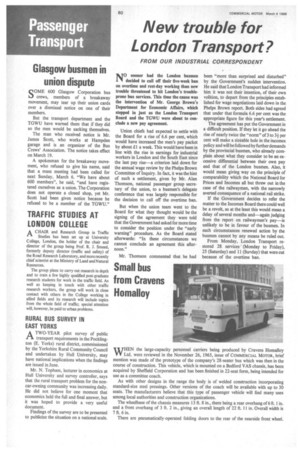New trouble for London Transport?
Page 62

If you've noticed an error in this article please click here to report it so we can fix it.
FROM OUR INDUSTRIAL CORRESPONDENT NO sooner had the London busmen decided to call off their five-week ban on overtime and rest-day working than new trouble threatened to hit London's troubleprone bus services. This time the cause was the intervention of Mr. George Brown's Department for Economic Affairs, which stepped in just as the London Transport Board and the TGWU were about to conclude a new pay agreement.
Union chiefs had expected to settle with the Board for a rise of 6.6 per cent, which would have increased the men's pay packet by about £.1 a week. This would have been in line with the rise in earnings for industrial workers in London and the South East since the last pay rise—a criterion laid down for the annual wage review by the Phelps Brown Committee of Inquiry. In fact, it was the hint of such a settlement, given by Mr. Alan Thomson, national passenger group secretary of the union, to a busmen's delegate conference that was largely responsible for the decision to call off the overtime ban.
But when the union team went to the Board for what they thought would be the signing of the agreement they were told that the Government had asked for more time to consider the position under the "early warning" procedure. As the Board stated afterwards: "In these circumstances we cannot conclude an agreement this afternoon."
Mr. Thomson commented that he had been "more than surprised and disturbed" by the Government's sudden intervention. He said that London Transport had informed him it was not their intention, of their own volition, to depart from the principles established for wage negotiations laid down in the Phelps Brown report. Both sides had agreed that under that formula 6.6 per cent was the appropriate figure for this year's settlement.
The agreement has put the Government in a difficult position. If they let it go ahead the rise of nearly twice the "norm" of 3 to 34-per cent will make a sizeable hole in the incomes policy and will be followed by further demands by the provincial busmen, who already complain about what they consider to be an excessive differential between their own pay and that of the London busmen. Also, it would mean giving way on the principle of comparability which the National Board for Prices and Incomes all but threw out in the case of the railwaymen, with the narrowly averted consequence of a national rail strike.
If the Government decides to refer the matter to the Incomes Board there could well be a revolt, as at the least this would mean a delay of several months and again judging from the report on railwaymen's pay—is unlikely to be in favour of the busmen. In such circumstances renewed action by the busmen cannot by any means be ruled out.
From Monday, London Transport restored 28 services (Monday to Friday), 25 (Saturday) and 11 (Sunday) that were cut because of the overtime ban.
























































































































































